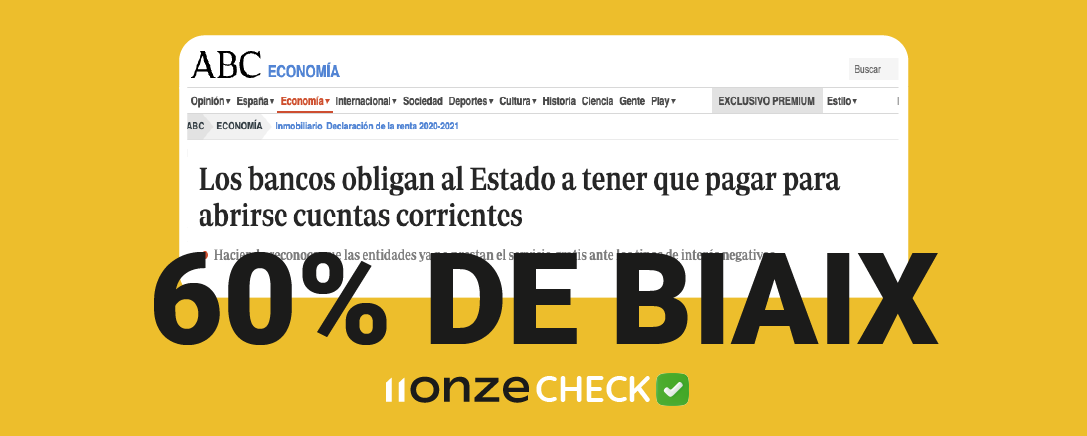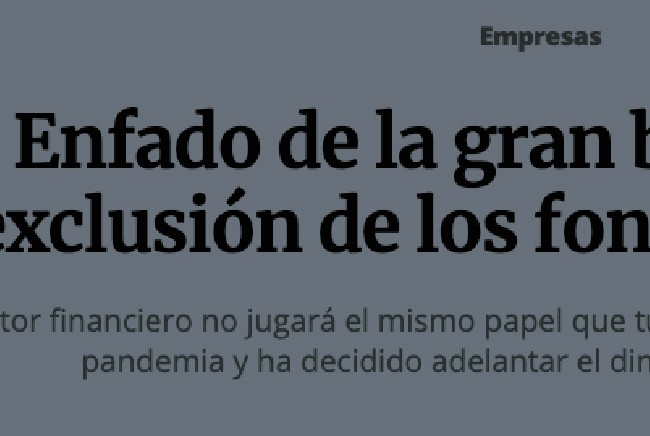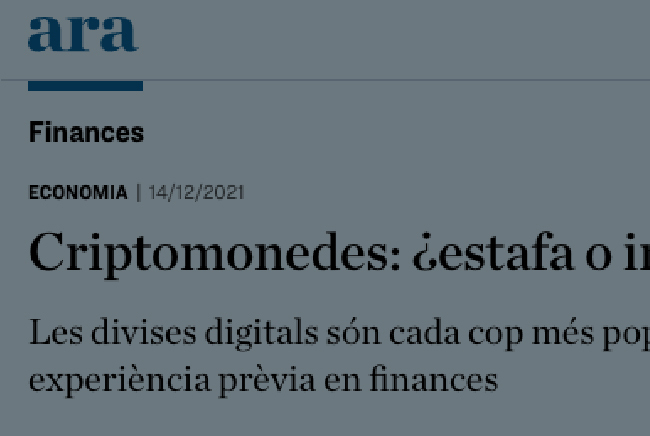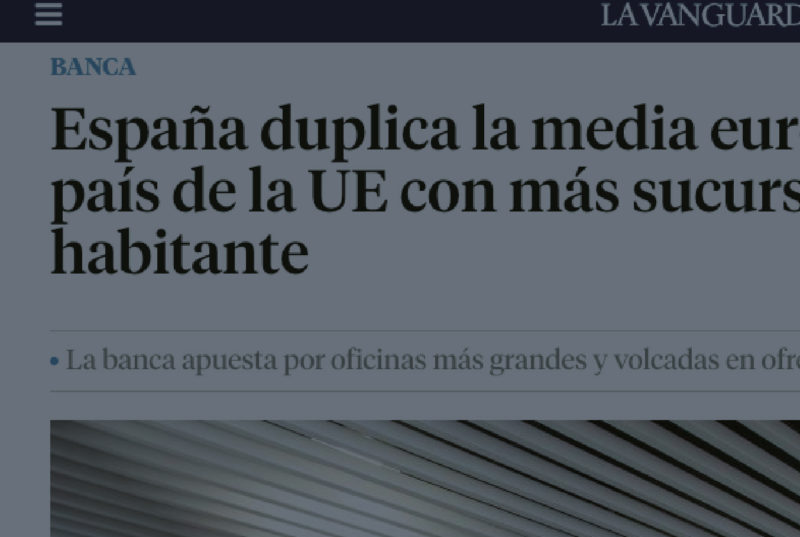

11Onze Check: rescued banks charge the State
The monetary policies of the European Central Bank maintain negative interest rates that penalise savings in order to reactivate consumption. This has led to banks not offering a good return on deposits and even charging us for the money deposited. A phenomenon that has spread to the current accounts of state administrations, by banks that have been bailed out with public money. Do they have the right to impose deposit commissions on public administrations? We focus on a news item from ‘ABC‘ to contrast this information with the Bias Method.
Since 2014, when the European Central Bank (ECB) established that private banks would have to pay a charge of 0.40% to keep money, the charging of commissions for deposits by banks focused, at first, on individuals and businesses, but has also reached the institutional client.
This situation penalises the profitability of taxpayers’ money and has created a tug-of-war between private banks and the public administration. The conflict became evident in the last public tender to manage the current account of the Fondo de Reestructuración Ordenada Bancaria (FROB), which in the first instance was left empty because the FROB had established that the winning bank could not charge interest on its accounts and deposits.
The lack of competition is obvious, especially after the banking consolidation that generated an oligopoly controlling 60% of the financial market. Likewise, parts of the State Administration, such as the Congress and the Senate, have transferred the treasury of their deposits to the Bank of Spain in order to avoid private banking commissions.
A concentration of financial power that, even so, has removed any possibility of turning the bank bailout debacle into a social investment after the takeover of Bankia by CaixaBank, and the subsequent disappearance of 61% of Bankia’s public shareholding, and 21 billion of the bailout that has still not been repaid. A democratic anomaly that highlights the lack of public banks in Spain, as we do find in other countries such as Germany, France, Italy, and Switzerland, which can alleviate this situation, or at least offer a more competitive alternative to private banking.
At 11Onze Check we take all these factors into account when analysing how the article in ‘ABC’ explains the reasons why banks force the State to pay fees for their deposits, until recently unheard of, and we conclude that it is 60% biased.
INTENT
The subtitle of the article states that “The Treasury recognises that banks are no longer providing the service for free in the face of negative interest rates”, a message that is reinforced throughout the article. This may lead us to think that, in the past, banks offered this service free of charge, as if it were an altruistic service. But is this really the case? This ‘free’ service was generally conditional on contracting other products or services from the financial institution, such as payroll management or payments to suppliers. And we cannot forget that deposits are an asset of the bank.
CONTEXT
The information leaves out key elements from the article, such as the fact that CaixaBank, the bank awarded the contract to manage the ministry’s current accounts, is one of the financial institutions bailed out with public money, and has not yet repaid this money.
There is no contextualisation of the malaise of the big banks with the state government in relation to the Next Generation funds, due to the fact that they cannot act as intermediaries and charge commissions. On the contrary, it simply repeats the banking narrative, the narrative of fear: “[…] Money from Europe is being lost because of slow execution. The funds are not flowing as expected into the real economy – it is also being felt in economic growth”.
Nor is another key piece of information given: that of record banking profits. Specifically, CaixaBank had a profit of more than 5,300 million euros in 2021. What is the urgency of having to charge the government for deposits?
ENDOGAMY
The article limits itself to giving the view of traditional banking through statements from “financial sources”, without specifying, when it talks about European funds, but at no time does it explain the version of the Ministerio de Economía y Empresa or other official bodies such as the Instituto de Crédito Oficial (ICO).
FOG
The information is foggy because it does not present alternatives to private banking, and would have us believe that the banks had done us a favour with their selfless altruism, until they had no alternative but to charge fees to the state for a reason totally unrelated to them, such as the ECB’s monetary policies. It does not explain that there are other options.
Moreover, the news item is imprecise because it does not detail amounts. Which are the entities charging the administrations? For what? How is it calculated? Providing specific data could make these rescued financial institutions blush.
COMMERCIAL MOTIVES
It is no secret that a large part of ‘ABC’s’ advertising revenue comes from private banking. Moreover, the Vocento group, to which the newspaper belongs, is owned by Santander Asset Management, a Banco Santander company. Does this create a conflict of interest whereby the newspaper is forced to disseminate a type of narrative that follows the same line as that of the banks, while ‘forgetting’ to explain the counterpart that could challenge this narrative?
VOCATION OF SERVICE
A situation that is clearly contrary to the public interest is accepted and normalised as a fait accompli. There is no mention of existing alternatives in other countries around us, such as public banks. Nor is there any explanation of the ethical incongruity of a financial institution that has been bailed out with public money charging commissions to a public administration when it has still not repaid 21 billion euros of this bailout. Therefore, the news does not seem to serve the interests of the public, but rather that of the banks.
To learn more about the Bias Method that we have followed to contrast this information, you can find it here. If you would like to send us economic information to verify, you can do so by writing to [email protected].
11Onze is the fintech community of Catalonia. Open an account by downloading the super app El Canut on Android and Apple and join the revolution!






👏
Gràcies, Daniela!!!
👌
Gràcies, Joan!!!
L’11Check i les anàlisi que en feu m’ajuden a comprendre notícies que altrament només em quedaria amb la carcassa. Gràcies.
Celebrem que trobis útil aquest contingut, Francesc!
Bona informaciò
Celebrem que t’hagi agradat, Ricard. Gràcies pel teu comentari!!!
Mare meva com ens maregen per seguir xusclant-nos a tots!!!
Moltes gràcies pel teu comentari, Vicenç!!!
Bona informació. Penosa la prepotència de la banca tradicional i el que els envolta, sempre pensant amb amb la dita de millor dolent conegut que bo per conèixer per aprofitar-se de la gent. Pot ser fora bo dir que per perduts millor de cap al riu, qui sap igual ens adonem que sabem nedar i ens en sortim i si algú no sap nedar gaire esperem que 11Onze sigui un bon socorrista. Gràcies .
Amb el temps i paciència, ho aconseguirem… Moltes gràcies pel teu comentari, Pere!!!
El poder mediàtic al servei d‘interessos econòmics deixa de dir-se periodisme
Cert, però és la deriva que malauradament s’ha instaurat a la societat d’avui en dia. Moltes gràcies pel teu comentari, Xavier!!!
Ok 👍
Gràcies pel teu comentari Josep!
Molt entenedor. Gràcies per la informació.
🙌
Genial que t’hagi agradat James! Seguim…
Un article molt entenedor, que evidencia que “el poble” no sabem de la missa la meitat. La manipulació informativa és l’ordre del dia. Tenim un problema: els grans grups de comunicació, d’una banda en mans d’interessos polítics, i de l’altra en mans d’interessos econòmics. Gràcies per informar amb dades que es poden comparar i opinions que es poden contrastar.
Doncs, sí, Mercè, malauradament és així, tal com tu mateixa dius. Moltes gràcies pel teu comentari!!!
Bon analisi, vergonyos i immoral la banca,com sempre
El fet de cobrar comisions i interesos a les administracions quan encara no han tornat el que deuen ,que no ho hagi una banca pública.i que el govern i gobierno ni ho questionen
Tot plegat es un cau de ultralliberalisme despietat
Gràcies per l’analisi
Doncs ja sabem tots com va tot plegat, però no ens equivoquem que aquí falla tot, la banca tradicional i també les administracions per l’evident mala gestió política que fan quasi tots els polítics, i he dit quasi per no defenestrar als pocs que són honrats i que fan les coses bé, i que per tant, potser valen la pena… Moltes gràcies pel teu comentari, Alícia!!!